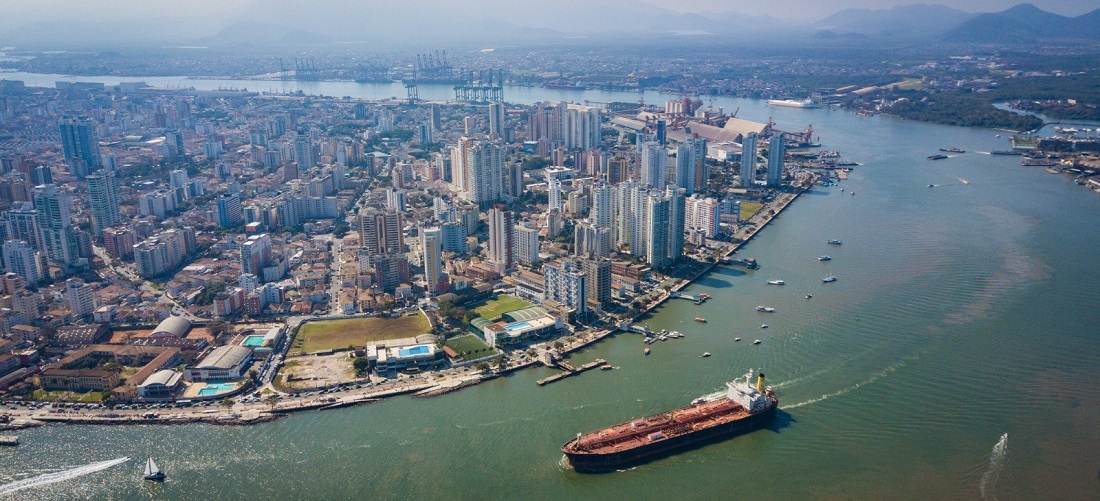
Brazilian ports face 15-year infrastructure lag
Oct, 09, 2023 Posted by Gabriel MalheirosWeek 202339
When it comes to infrastructure for port access, encompassing water, road, and rail access, Brazil lags behind by 15 years compared to countries with large port complexes engaged in international trade. This assessment comes from the National Transatlantic Navigation Center (Centronave).
According to experts, bureaucratic customs processes also impact the country’s competitiveness and efficiency in the foreign market.
According to Claudio Loureiro de Souza, the executive director of Centronave, the insufficient depth of navigation channels in ports is the sector’s main bottleneck because newer ships require increasingly greater depths.
As a result, without constant dredging, the country cannot accommodate modern vessels. Souza calculates Brazil’s lag compared to the world based on the fabrication year of the oldest ship that can no longer navigate our ports. “We measure it by the year of the oldest ship that can no longer navigate our ports. We have models from 2008 that can’t.”
According to Centronave’s estimate, due to the lack of depth, only the Port of Santos, the largest in Latin America, misses out on handling around 500,000 TEUs per year, resulting in an estimated annual loss of $21 billion in import and export revenues, directly affecting the country’s trade balance. Today, Brazil can only receive ships of up to 11,500 TEUs, while Asia, Europe, and North America can operate vessels of up to 24,000 TEUs.
“The loss of national competitiveness delays economic growth, also hampering development and the creation of new jobs in the country. To achieve the global average, we need to invest in terminals capable of serving larger and more energy-efficient ships,” says Souza.
The Port Authority of Santos (APS) estimates that a dredging project to lower the current depth from 15 to 17 meters will begin next year.
Souza is optimistic about the project but emphasizes the importance of a long-term dredging program. “This will help to usher in a new generation of larger, more energy-efficient ships.” As a result, fuel costs will be lower, as will the environmental impact, because a larger ship consumes up to 68% less fuel per TEU transported,” he adds.
Trucks
Mario Velardo, former director of Maersk and CEO of MTM Logix, says that, in addition to improvements in infrastructure, technology is the path to efficient logistics.
“The challenge encompasses the entire logistics ecosystem. For example, the lack of real-time visibility for trucks arriving at ports creates bottlenecks and delays. This could be mitigated by implementing advanced tracking systems. Many processes are still manual, which slows down operations and increases the risk of errors. Automating these processes would significantly improve efficiency.”
Extensive Documentation
Velardo also says that “effective management of areas around ports is essential. This involves not only technological solutions but also better road and rail connections. Adopting multimodal transport solutions throughout the country can significantly improve logistics efficiency.”
According to the former director of Maersk and CEO of MTM Logix, it is necessary to streamline customs clearance. “The documentation for a single container to enter port areas is extensive. Simplifying this through digital solutions could speed up the process.”
The logistics expert also points out that the technology supporting global container processes is outdated, often by up to two decades. “This is particularly evident in Brazil, where limited ocean routes offer travel times of less than ten days to international ports. Using the time that containers spend on board to prepare import processes could be a game-changer.”
Furthermore, Velardo says that “creating a unified global standard could significantly reduce administrative burdens and costs.
He believes that standardizing documentation and customs processes can have an immediate impact on reducing transport costs. “This is particularly crucial for Brazil, given its geographic challenges and its status as a net importer of containers.”
Autonomy in Access
The Brazilian Ports Association (ABTP) is finalizing a proposal to be submitted to the federal government that seeks, among other points, to give greater autonomy to concessionaires to make structural improvements to access, which is currently the responsibility of public management.
ABTP President Jesualdo Silva says that the central axis of the proposal to be presented to the Ministry of Ports and Airports is to transform leasing contracts into exploration contracts of a private nature.
“From there, making investments according to demand will be possible. The port authority has an exclusive function in dredging, and it is not uncommon to see inefficiency. It’s not that the people working there are incompetent, but the entire legal framework imposes inefficiency.”
A delegation from ABTP was in Hamburg, Germany, last week. The main objective of the group of 38 representatives was to mature the proposals that will be delivered to the federal government.
According to the president of ABTP, the example seen at the Port of Hamburg shows that the model of contracts with private nature can be implemented and demonstrates effectiveness in modernizing infrastructure. With this model, companies can share the costs of necessary work, avoiding loss of business.
Source: A Tribuna
To read the original news report, click on: https://www.atribuna.com.br/noticias/portomar/portos-brasileiros-enfrentam-defasagem-de-15-anos
-
Other Cargo
Dec, 06, 2022
0
Brazil imports 2.386 mln tonnes of fertilizers in November
-
Ports and Terminals
Sep, 14, 2023
0
Santos Port struggles to encourage railway solutions for container transport
-
Jan, 22, 2025
0
Portonave Named Brazil’s Most Efficient Terminal by ANTAQ
-
Shipping
Aug, 09, 2024
0
Massive explosion rocks Yang Ming boxship at berth in Ningbo

